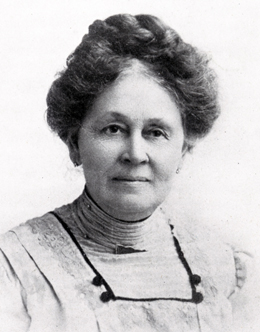In 1906, Emma Smith DeVoe (1848-1927) is elected president of the Washington Equal Suffrage Association. At the time of her election the organization is flagging badly, with exactly two members. After her election, membership jumps to 2,000. It is partly through her work that in 1910 the women's national suffrage caucus is held in Washington state, and Washington men vote in favor of women's suffrage, making Washington the fifth state in the nation to give women the right to vote.
DeVoe came to Washington with her husband, John DeVoe, in 1905. She was a seasoned organizer from the national crusade. Dr. Cora Smith Eaton contributed office space for headquarters in her suite in downtown Seattle's Arcade Building. DeVoe enlisted support from other women's organizations and launched a grassroots campaign with few parades but with plenty of speakers at supportive club, farmer, labor, and Protestant church gatherings.
Her campaign ran into conflict with that of the Spokane suffrage leader May Arkwright Hutton (1860-1915), a rags-to-riches millionaire who had come to Idaho as a miner's cook, then struck the motherlode in the Coeur d'Alene mines. Hutton's working-class background, Democratic and progressive politics, and flamboyant style ran counter to DeVoe's upper-class background and Republican politics. Such differences in style and outlook no doubt aggravated conflicts between the two factions.
In 1909, when the National American Woman Suffrage Association (NAWSA) convened in Seattle, fighting between the DeVoe and Hutton factions peaked, and the result was two Washington delegations. In what the press called a Solomon's judgment, NAWSA President Anna Howard Shaw declared that both delegations could be seated, but that neither could vote.
However, the campaign moved ahead and factionalism took a back seat. In 1910, Washington women won the vote.
In 2000, Emma Smith DeVoe was elected to the National Women's Hall of Fame in Seneca Falls, New York.

